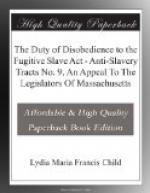away, with all its horrible chances. You hide
in a neighboring swamp, where you are bitten by a
venomous snake, and your swollen limb becomes almost
incapable of motion. In great anguish, you drag
it along, through the midnight darkness, to the hut
of a poor plantation-slave, who binds on a poultice
of ashes, but dares not, for fear of his life, shelter
you after day has dawned. He helps you to a deep
gully, and there you remain till evening, half-famished
for food. A man in the neighborhood keeps blood-hounds,
well trained to hunt runaways. They get on your
track, and tear flesh from the leg which the snake
had spared. To escape them, you leap into the
river. The sharp ring of rifles meets your ear.
You plunge under water. When you come up to take
breath, a rifle ball lodges in your shoulder and you
plunge again. Suddenly, thick clouds throw their
friendly veil over the moon. You swim for your
life, with balls whizzing round you. Thanks to
the darkness and the water, you baffle the hounds,
both animal and human. Weary and wounded, you
travel through the forests, your eye fixed hopefully
on the North Star, which seems ever beckoning you
onward to freedom, with its bright glances through
the foliage. In the day-time, you lie in the
deep holes of swamps, concealed by rank weeds and
tangled vines, taking such rest as can be obtained
among swarms of mosquitoes and snakes. Through
incredible perils and fatigues, footsore and emaciated,
you arrive at last in the States called Free.
You allow yourself little time to rest, so eager are
you to press on further North. You have heard
the masters swear with peculiar violence about Massachusetts,
and you draw the inference that it is a refuge for
the oppressed. Within the borders of that old
Commonwealth, you breathe more freely than you have
ever done. You resolve to rest awhile, at least,
before you go to Canada. You find friends, and
begin to hope that you may be allowed to remain and
work, if you prove yourself industrious and well behaved.
Suddenly, you find yourself arrested and chained.
Soldiers escort you through the streets of Boston,
and put you on board a Southern ship, to be sent back
to your master. When you arrive, he orders you
to be flogged so unmercifully, that the doctor says
you will die if they strike another blow. The
philanthropic city of Boston hears the bloody tidings,
and one of her men in authority says to the public:
“Fugitive slaves are a class of foreigners, with
whose rights Massachusetts has nothing to do.
It is enough for us, that they have no right
to be here."[1] And the merchants of Boston
cry, Amen.
[Footnote 1: Said by the U.S. Commissioner, George Ticknor Curtis, at a Union Meeting, in the Old Cradle of Liberty.]




